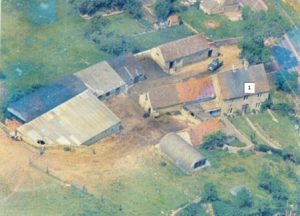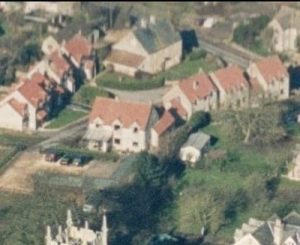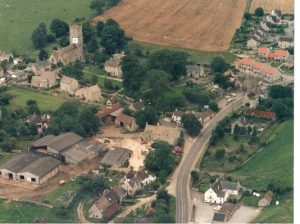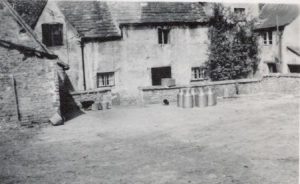The Farms of Burton
Author: Chris Bennett
The origins of farming in Burton are not clearly known in detail, but we can expect they date back several hundreds of years.
The land surrounding Burton may well have been a part of the much larger Castle Combe Estate which has swathes of land in the area. The estate would no doubt have had many farms all contributing to the economy of the landowner and its residents.
This article includes a number of very interesting photographs which should help readers appreciate the landscape of this village in the mid 1900’s and how this has evolved into what is a complete change to introducing additional housing for the village, resulting in the farms move to its present location on the outskirts of the village.
Present day farms of Burton are owned and managed by the Clark family who have been in this village for several generations, from the information of current family members this is at least 4th generation. We can begin this article by mentioning Bert Clark (1896-1989) who began farming at New House Farm in the early 1930’s. The original farm house had a thatched roof and at some stage there was a large fire which destroyed most of the farm house.
The house was rebuilt a short distance from the original building and remained a farm until the late 1970’s.
In 1938 Bert Clark purchased Burton Farm which was situated a few hundred metres from New House Farm and again this had dairy cows, pigs and gardens to feed the family.
Apparently, at some stage along with Bert there were in the region of 13 family members living in the Burton farms, or nearby North Wraxhall and The Gibb.
Both farms were owned by Bert Clark although in later years his son Fred took on some of the management of the farms.
New House Farm
The original New House Farm is believed to date back several hundred years or so, and was situated on the main road through the village of Burton. The farm was about 150 acres in size and had a diverse range of specialism and sought mainly to provide sufficient food for the family and to sell the remainder to finance the upkeep of the farm. The farm had about 50 milking cows and other livestock.
The farm closed its business in late 1970’s, and the money raised from the sale help finance the installation of a ‘Rotary Parlour’ for milking cows at Burton Farm.
The farmhouse still remains and the surrounding area has since been developed into what is now Fredericks Way, named in memory of son Fred Clark (1934-87).
.

The main farm house (1) and agricultural outbuildings c.1970s


The farm house standing among the new housing development of Fredericks Way (approx. 1990)

Burton Farm (pre 2000)
The original Burton Farm is believed to date back approx 300 years, the actual farmhouse is a listed building.

Burton Farm (around 1987-89). The farm included a number of outbuildings/barns used as a milking parlour, silage shed, cubicles for the cows to sleep in and five pig sheds. The farm extended over approx. 200 acres.


Rear entrance to the Old Farm House, with galvanised milk churns awaiting collection for the dairy. Upstairs included a cheese room.
This farm was moved to land off Nettleton Road on the outskirts of the village in 2000 to make way for the housing development which is now known as Burton Farm Close with some additional houses along the main road.
Burton Farm (2000 – present day)
The farm moved to its current location in 2000 and has a herd of around 240 dairy cattle. The farm is owned and managed by Greg Clark (grandson of Bert) but more recently his son Freddie has taken over the reins.
Mulberry Farm (2000 – present day)
In 2010 Dan Clark (grandson of Bert) developed what is now called Mulberry Farm at the top of Marsh Lane, which has had a beef herd of cows and now has a main crop of hay and straw. More recently it has developed an equestrian centre with a riding school. Dan has continued in the farming sector mainly out of interest for the job and less now as a business.
More recently the farm has diversified further, opening the Burton Farm Shop and Kitchen in Summer 2021.



0 Comments